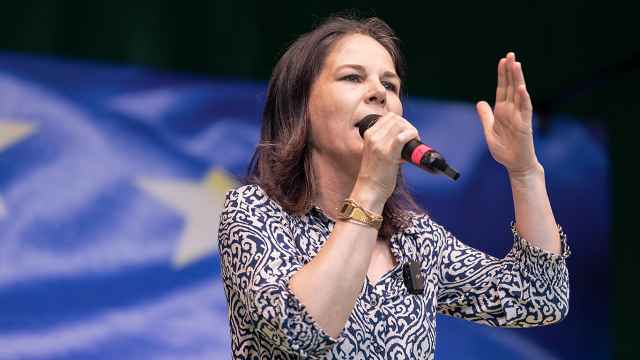Among about 40 bills signed by President Vladimir Putin in a marathon session on Tuesday was a widely lambasted law that will strip hundreds of independent Russian television channels of a basic source of income: advertising.
The law, which will go into effect on Jan. 1, 2015, bans advertising on all subscription channels as well as on channels that can only be viewed with a decoding device. Excluded from the ban are all "national, compulsory, universally accessible" channels and those conveyed by terrestrial broadcasting — in other words, all the leading state-run channels that dominate Russia's airwaves.
Bundled together in a packet with two other amendments to Russia's advertising law, the bill raced through the State Duma and the Federation Council earlier this month just weeks after reports of it first surfaced in the Russian media.
Russia's Federal Mass Media Inspection Service last week published an analysis of the law's impact which found that of the 3,462 broadcast licenses that have been issued in Russia, about 1,400 of them are for "unique subscription television channels" that will be barred from advertising.
About 300 of the channels to be barred from advertising are state-owned, the agency said, without specifying further.
Criticism of the law has come from all corners. The Duma's leading minority factions came out against the bill during the brief period prior to its approval, RBC Daily reported, as have the heads of cable and satellite television channels and civil society watchdogs both at home and abroad.
The presidential human rights council last week said that the amendments will make "monopolization on the market of television advertising unavoidable."
According to the bill's author, Igor Zotov, a Duma deputy and leader of the marginal Russian Pensioners for Justice party, the bill is supposed to level the playing field for free and subscription-based channels.
However, according to the council's statement, the ability to sell advertising space is not a competitive advantage for subscription channels but rather a "necessary measure."
"Channels that broadcast in cable and satellite networks are forced to employ commercial advertising to ensure at least minimal profitability," the statement said, adding that advertising helps offset the fact that many Russian viewers cannot afford to pay higher subscription charges for the channels.
The Organization for Security and Co-operation in Europe, or OSCE, also called on Putin to veto the measures earlier this month.
"If implemented, these amendments could lead to cutting off private small- and medium-scale channels from their principal source of revenue, which is advertising. That could further limit media pluralism and free flow of information in Russia," said Dunja Mijatovic, OSCE's representative on freedom of the media, according to a statement on the organization's website.
The heads of several Russian channels — including Natalya Sindeyeva of beleaguered opposition-minded news channel Dozhd — wrote a letter addressed to Putin, Prime Minister Dmitry Medvedev and State Duma speaker Sergei Naryshkin in early July, urging the government to consult with the business community before rushing to a decision.
Of the 270 cable and satellite channels in Russia, "excluding the advertising model will place about 150 on the brink of survival," the letter said.
See also:
Google Fined $6,000 for Ad Infringements By Russian Anti-Trust Watchdog
Contact the author at d.damora@imedia.ru
A Message from The Moscow Times:
Dear readers,
We are facing unprecedented challenges. Russia's Prosecutor General's Office has designated The Moscow Times as an "undesirable" organization, criminalizing our work and putting our staff at risk of prosecution. This follows our earlier unjust labeling as a "foreign agent."
These actions are direct attempts to silence independent journalism in Russia. The authorities claim our work "discredits the decisions of the Russian leadership." We see things differently: we strive to provide accurate, unbiased reporting on Russia.
We, the journalists of The Moscow Times, refuse to be silenced. But to continue our work, we need your help.
Your support, no matter how small, makes a world of difference. If you can, please support us monthly starting from just $2. It's quick to set up, and every contribution makes a significant impact.
By supporting The Moscow Times, you're defending open, independent journalism in the face of repression. Thank you for standing with us.
Remind me later.






